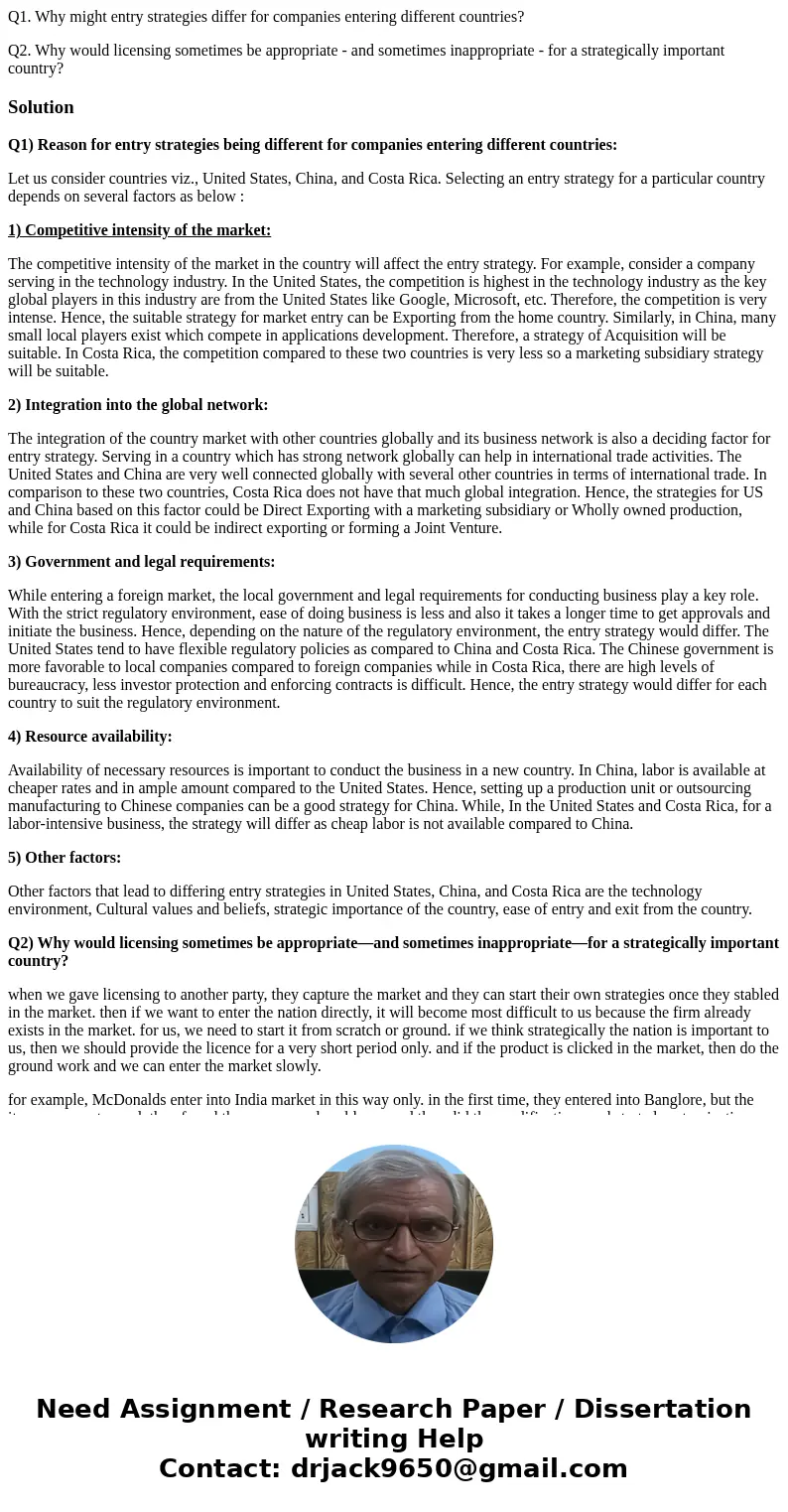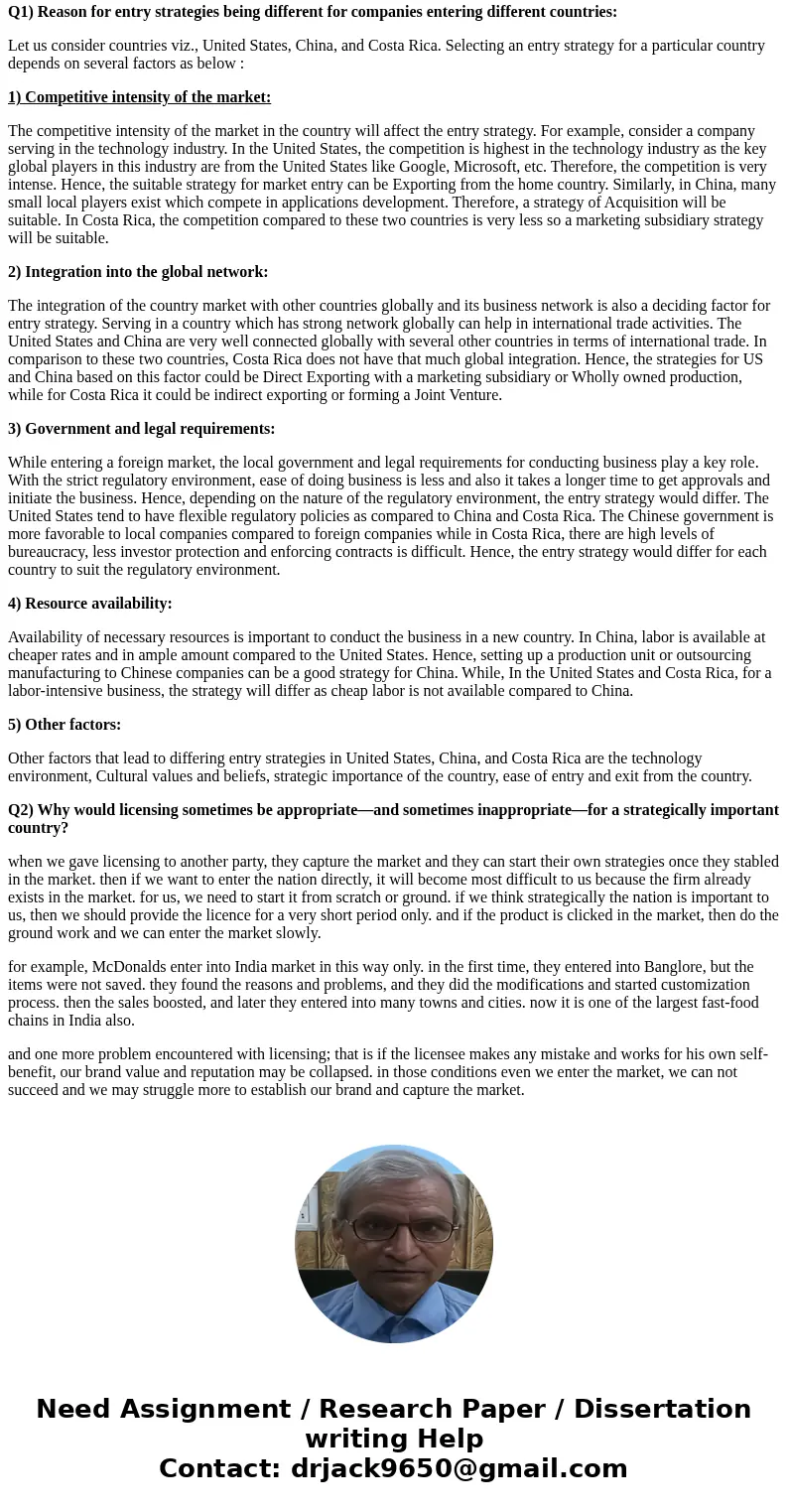Q1 Why might entry strategies differ for companies entering
Q1. Why might entry strategies differ for companies entering different countries?
Q2. Why would licensing sometimes be appropriate - and sometimes inappropriate - for a strategically important country?
Solution
Q1) Reason for entry strategies being different for companies entering different countries:
Let us consider countries viz., United States, China, and Costa Rica. Selecting an entry strategy for a particular country depends on several factors as below :
1) Competitive intensity of the market:
The competitive intensity of the market in the country will affect the entry strategy. For example, consider a company serving in the technology industry. In the United States, the competition is highest in the technology industry as the key global players in this industry are from the United States like Google, Microsoft, etc. Therefore, the competition is very intense. Hence, the suitable strategy for market entry can be Exporting from the home country. Similarly, in China, many small local players exist which compete in applications development. Therefore, a strategy of Acquisition will be suitable. In Costa Rica, the competition compared to these two countries is very less so a marketing subsidiary strategy will be suitable.
2) Integration into the global network:
The integration of the country market with other countries globally and its business network is also a deciding factor for entry strategy. Serving in a country which has strong network globally can help in international trade activities. The United States and China are very well connected globally with several other countries in terms of international trade. In comparison to these two countries, Costa Rica does not have that much global integration. Hence, the strategies for US and China based on this factor could be Direct Exporting with a marketing subsidiary or Wholly owned production, while for Costa Rica it could be indirect exporting or forming a Joint Venture.
3) Government and legal requirements:
While entering a foreign market, the local government and legal requirements for conducting business play a key role. With the strict regulatory environment, ease of doing business is less and also it takes a longer time to get approvals and initiate the business. Hence, depending on the nature of the regulatory environment, the entry strategy would differ. The United States tend to have flexible regulatory policies as compared to China and Costa Rica. The Chinese government is more favorable to local companies compared to foreign companies while in Costa Rica, there are high levels of bureaucracy, less investor protection and enforcing contracts is difficult. Hence, the entry strategy would differ for each country to suit the regulatory environment.
4) Resource availability:
Availability of necessary resources is important to conduct the business in a new country. In China, labor is available at cheaper rates and in ample amount compared to the United States. Hence, setting up a production unit or outsourcing manufacturing to Chinese companies can be a good strategy for China. While, In the United States and Costa Rica, for a labor-intensive business, the strategy will differ as cheap labor is not available compared to China.
5) Other factors:
Other factors that lead to differing entry strategies in United States, China, and Costa Rica are the technology environment, Cultural values and beliefs, strategic importance of the country, ease of entry and exit from the country.
Q2) Why would licensing sometimes be appropriate—and sometimes inappropriate—for a strategically important country?
when we gave licensing to another party, they capture the market and they can start their own strategies once they stabled in the market. then if we want to enter the nation directly, it will become most difficult to us because the firm already exists in the market. for us, we need to start it from scratch or ground. if we think strategically the nation is important to us, then we should provide the licence for a very short period only. and if the product is clicked in the market, then do the ground work and we can enter the market slowly.
for example, McDonalds enter into India market in this way only. in the first time, they entered into Banglore, but the items were not saved. they found the reasons and problems, and they did the modifications and started customization process. then the sales boosted, and later they entered into many towns and cities. now it is one of the largest fast-food chains in India also.
and one more problem encountered with licensing; that is if the licensee makes any mistake and works for his own self-benefit, our brand value and reputation may be collapsed. in those conditions even we enter the market, we can not succeed and we may struggle more to establish our brand and capture the market.


 Homework Sourse
Homework Sourse